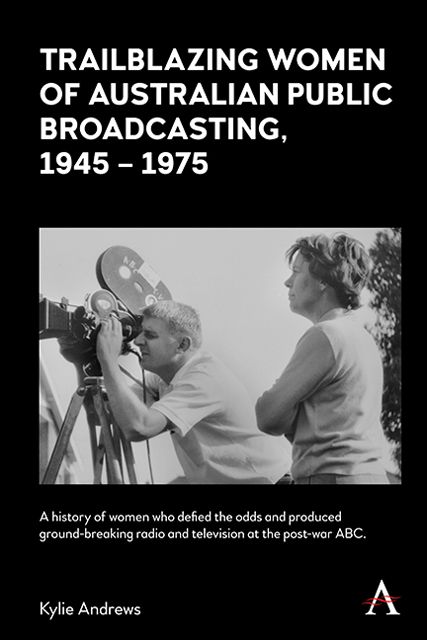Book contents
- Frontmatter
- Dedication
- Contents
- List of Figures
- List of Abbreviations
- Preface
- 1 Introduction
- 2 Career Snapshots
- 3 Welcome to the ABC, Ladies
- 4 The New Nation-Builders
- 5 Talent Was Not Enough
- 6 Thinking Outside the Box
- 7 Timely Escapes and Bittersweet Homecomings
- 8 International Adventures and Global Networking
- 9 Farewell to the ABC
- 10 Epilogue
- Reference List
- Index
7 - Timely Escapes and Bittersweet Homecomings
Published online by Cambridge University Press: 09 December 2022
- Frontmatter
- Dedication
- Contents
- List of Figures
- List of Abbreviations
- Preface
- 1 Introduction
- 2 Career Snapshots
- 3 Welcome to the ABC, Ladies
- 4 The New Nation-Builders
- 5 Talent Was Not Enough
- 6 Thinking Outside the Box
- 7 Timely Escapes and Bittersweet Homecomings
- 8 International Adventures and Global Networking
- 9 Farewell to the ABC
- 10 Epilogue
- Reference List
- Index
Summary
In the post-war decades many broadcasters followed the classic Australian ritual of travelling overseas. The desire to be challenged and prove oneself was common among women embarking on overseas adventures. For Therése Denny, Catherine King and Kay Kinane, and even Joyce Belfrage in Britain, international travel created new opportunities, both personal and professional. They collected a cache of experiences and insights and transformed into the type of globally and cultural aware citizens who personified the public broadcasting remit. Ros Pesman and Angela Woollacott have written extensively about the ‘secular pilgrimages’ made by generations of Australian women. By undertaking transformative departures, they could find respite from the compromises they faced at home. Many travelled, Woollacott maintained, as an ‘assertion of independence, a bid for self-discovery, and an escape from domestic gender constraints.’ Transnational ‘sojourns’ could also be highly rewarding from a professional standpoint, as Yves Rees explained:
While practised by all genders, sojourning had particular salience for women as one of the few respectable and culturally comprehensible routes to feminine independence, anonymity and adventure. Work or study rooted the sojourn in esteemed institutions or structures, and provided economic resources and incentives in the form of scholarships, wages and patronage. The pursuit of professional or educational opportunities could therefore legitimise female aspirations to mobility, providing the necessary stimulus or pretext for women to leave the domestic spaces of home and nation.
Like many dominion women who underwent transformative departures in the post-war decades, Therése Denny, Catherine King and Kay Kinane all thrilled in their international adventures. The freedom of their overseas excursions allowed the cohort, like many expatriate women, to ‘find new ways of speaking, living and loving’.
In the post-war era, Australia's approach to the status of women in society was sluggish compared to other western nations. At the 1965 ‘Conference on Working Women’ in Melbourne, a representative from the US Women's Labor Bureau announced Australia ‘lagged in its attitude to the employment of women [and] that the Australian pattern of employment at the time was similar to that in the US before World War II.’ In 1974, historians Encel, MacKenzie and Tebbutt lamented Australia's continuing confusion about women and modernity:
Family life in Australia, it is said, has remained closer to the Victorian model; and even where the facts of family life have changed, the family ideology has been slow to reflect the new situation.
- Type
- Chapter
- Information
- Trailblazing Women of Australian Public Broadcasting, 1945-1975 , pp. 137 - 146Publisher: Anthem PressPrint publication year: 2022



